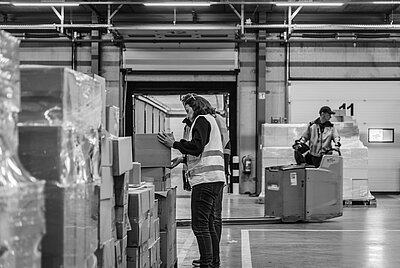Minimise packaging waste
It’s hard to eliminate packaging within e-commerce. Products need protection for delivery to ensure they arrive in good condition. But there are plenty of ways to reduce the impact of your packaging. Committing to using recyclable, biodegradable, or reusable materials for shipping will help minimise your carbon footprint.
These choices also help consumers feel better about shopping with you. If they have confidence that they can recycle, return, or re-purpose their packaging when it arrives, then you’re helping them to make better choices too.
You can also help consumers by giving them the option of bundling their deliveries, whether combining them with a scheduled delivery date that’s a little slower or bundling their own orders together into fewer shipments and using fewer packaging materials overall. This is something we’ve committed to in our own operations with great results.
Online fashion retailer ASOS uses recyclable mailing bags, something which German-based fashion retailer Zalando has also switched to. Zalando’s 2023 Sustainability Progress Report highlighted that 82% of its 52,000 tonnes of packaging materials were made from recycled materials and 99% of it was recyclable.
Promote circular economy practices
A recent article from McKinsey & Company shows that simply promoting or highlighting sustainable options to your customers can have a big impact on your emissions. It says that: “Signposting can lead to a 2.8 to 5.2 times emissions reduction compared to actioning only on Scopes 1 and 2 emissions.”
Taking time to ensure you have a clear picture of your emissions and sustainability impact, can directly influence your customers’ choices.
You might want to create a dedicated section on your website for sustainable products or mark them with a ‘green’ badge that makes them easy to see immediately. Providing detailed product information, including where and how items are made, will help your customers make informed choices with circularity front of mind.
There are many other ways to introduce circularity to your e-commerce strategy, some of which are already being successfully implemented by retailers. US-based outdoor clothing retailer Patagonia has an online platform called “Worn Wear”, where customers can trade in old gear for credit or buy pre-owned items, reducing their impact on the environment. French-based sports retailer Decathlon operates a Second Life programme on its website, allowing customers to buy used or refurbished sports equipment at a discount.
We’ve written recently about the boom in re-commerce and the importance for retailers to capitalise on this. More and more consumers are choosing to purchase second-hand items and choosing to do it online.
But there are plenty of other ways to introduce circularity to your e-commerce strategy.
- Offer recycling initiatives where customers have the option to return items like clothing, electronics, or packaging for proper disposal or reuse.
- Provide rental options for certain products, such as clothing or electronics.
- Give repair support to your customers to extend product life and discourage disposal.
- Reward customers with points or discounts for eco-conscious actions like recycling or choosing carbon-neutral shipping.
- Try trade-in discounts or store credit for old products returned for recycling or resale.
Reduce delivery impact
In a 2022 report, “Revealing the Secret Emissions of E-commerce,” the Clean Mobility Collective (CMC) and Stand Earth Research Group estimated that the last mile contributes approximately 50% of delivery CO2 emissions in Europe.
The impact of reducing delivery and returns requires attention and forward-thinking and is key to making your e-commerce greener, but it’s not just your deliveries to customers that create an impact. Return rates for online purchases are up to three times higher than purchases from physical stores.
It is important to pick transport partners that offer carbon-neutral or low-emission delivery options to help manage your delivery emissions, which are often out of your control. You can reduce last-mile emissions by promoting pickup from local lockers or stores instead of home delivery, something French fashion retailer La Redoute has embraced.
You could also choose to let your customers offset the carbon footprint of their order at checkout. Worldpack offers carbon-neutral shipping for partners via offset initiatives which customers can select at checkout.
Reducing the impact of your e-commerce initiatives will help put you on the front-foot for customer retention and brand reputation as well as doing part of your work towards keeping the planet greener.
Choose a supply partner that will help you make smarter, greener logistics choices. Speak to our team on +31 (0) 88 494 20 80 or email us at online@worldpack.eu.


